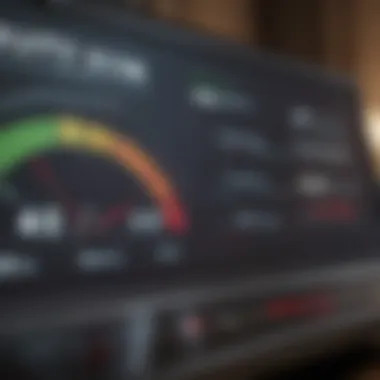Remove Late Payments from Your Credit Report Effectively


Intro
Removing a late payment from a credit report can significantly enhance a person's credit score. This process is crucial as credit scores play a major role in determining financial opportunities, such as securing loans or credit cards. Understanding the framework of credit scores and their implications on financial decisions prepares individuals to improve their credit status effectively.
Understanding Credit Scores
What is a Credit Score?
A credit score is a numerical representation of an individual’s creditworthiness. Typically, this score ranges from 300 to 850. Higher scores indicate better credit risk, meaning lenders are more likely to approve credit applications. Late payments can negatively impact this score and hinder future borrowing potential.
Importance of Credit Scores
Credit scores are vital for financial health. Lenders use these scores to assess the likelihood that a borrower will repay a loan. They influence interest rates and terms of credit agreements. A low score translates to higher interest rates, which can add up significantly over time.
How Credit Scores are Calculated
These scores are calculated based on various factors, predominantly:
- Payment history (35%): Timely payments improve scores, whereas late payments lower them.
- Credit utilization (30%): The ratio of current credit balances to available credit.
- Length of credit history (15%): The duration credit accounts have been active.
- Type of credit (10%): A mix of installment loans, revolving credit, etc.
- Recent inquiries (10%): How many times someone has applied for credit lately.
Common Myths About Credit Scores
There are several misconceptions about credit scores that can mislead individuals:
- Myth: Checking your own credit score harms it.
- Myth: Closing old credit accounts improves your score.
- Myth: All lenders use the same credit score.
Recognizing these myths allows for smarter credit management strategies.
Factors Affecting Your Credit Status
Payment History
Payment history is the most significant factor affecting your credit score. Each missed payment can stay on the report for up to seven years. It is vital to prioritize timely payments to maintain a positive credit profile.
Credit Utilization Ratio
The credit utilization ratio is a crucial aspect of credit health. Keeping balances below 30% of the available credit can positively impact scores. High utilization can signal financial distress to lenders.
Length of Credit History
A longer credit history is often beneficial, as it gives lenders a better picture of a borrower's credit behavior. New credit profiles may face challenges due to a lack of history.
Types of Credit Accounts
Various credit types, such as mortgages, credit cards, and personal loans, contribute to a well-rounded credit profile. Diversification can positively affect the credit score.
Recent Credit Inquiries
Every time a lender checks your credit report for a loan application, it's noted as a
Preamble to Credit Reports
Credit reports are essential documents that outline an individual’s credit history. Understanding them is crucial for anyone looking to navigate financial waters effectively. They influence various aspects of financial life, from loan approvals to interest rates. Thus, knowing how to manage and rectify issues within these reports is imperative.
Understanding Credit Reports
A credit report includes detailed information about your borrowing and repayment history. It showcases data such as account types, payment history, outstanding debts, and recent inquiries into your credit. Credit bureaus, primarily Equifax, Experian, and TransUnion, compile and maintain this information. Regularly reviewing your credit report helps you identify errors and understand your financial behavior. This is vital especially if you aim to remove late payments from your record. The implications of these inaccuracies can impede your financial progress.


Importance of Credit Scores
Your credit score, derived from the information in your credit report, serves as a numerical representation of your creditworthiness. It reflects your reliability as a borrower. Lenders often lean on this score as a deciding factor for extending credit. Generally, a higher score leads to lower interest rates and better loan conditions. For anyone looking to remove late payments, understanding how these entries affect one's overall score is crucial. A denied application or unfavorable terms can result from a low credit score, emphasizing the need for proactive credit management.
Remember, a good credit score opens financial doors that may otherwise remain shut.
Impact of Late Payments
Late payments can have a significant effect on your financial reputation and overall credit score. Understanding this impact is crucial for anyone looking to maintain or improve their credit standing. Late payments can result from various circumstances, but their ramifications are serious and lasting.
How Late Payments Affect Your Credit Score
When a payment is made after its due date, it gets reported to the credit bureaus. Each credit bureau has a scoring model that evaluates late payments as negative factors. Here are the key points about how late payments affect your credit score:
- Immediate Impact: A late payment can cause instant decreases in your score. The exact reduction varies based on your previous credit history. For someone with a strong credit score, the dip may be more pronounced than for someone with a lower score.
- Duration of Impact: The severity of the score change can depend on how late the payment is. Payments that are 30 days late usually have a lesser impact than those that are 60 or 90 days late. Furthermore, a late payment can stay on your credit report for up to seven years.
- Multiple Late Payments: If you have several late payments, the cumulative effect can lead to a substantial drop in your score, making it essential to manage payments carefully.
Important Note: Missing just one payment can significantly derail your credit journey. Regular payment habits are essential to avoid the damaging effects of late payments.
Long-Term Consequences of Late Payments
The consequences of late payments extend beyond just a temporary dip in your credit score. They shape your financial future in various ways:
- Increased Interest Rates: If lenders see late payments on your credit report, they may consider you a higher risk. This can lead to higher interest rates on loans and credit cards, making borrowing more expensive.
- Loan Denials: A bad credit score from late payments can lead to your loan applications being rejected. Whether you're looking for a home mortgage or a personal loan, lenders are less likely to approve you if your credit history shows frequent late payments.
- Insurance Premiums: Some insurance companies check credit scores when determining premiums. A lower score can result in higher rates for car and home insurance as well.
- Employment Opportunities: Certain employers might also check credit reports during the hiring process, particularly for financial positions. A history of late payments might hinder your chances of getting a job.
Identifying Late Payments on Your Credit Report
Understanding how to identify late payments on your credit report is crucial in effectively managing your credit history. Late payments can severely impact your credit score, which in turn can affect your ability to borrow money or get favorable interest rates. Thus, knowing where to look and how to identify these entries is a vital step toward improving your credit status.
Ways to Access Your Credit Report
Accessing your credit report can be straightforward. There are three primary credit bureaus: Experian, Equifax, and TransUnion. You can request a free report from each bureau once a year at AnnualCreditReport.com. This allows you to view your credit history without any cost. You may also sign up for a credit monitoring service, which often provides regular updates on your credit report. Some banks and financial institutions also offer tools for their customers to monitor their credit reports.
When you access your credit report, ensure you have a secure internet connection. Reputable sites will help protect your personal information. Always double-check the URL to confirm you are on the authentic site.
How to Review Your Report Thoroughly
When reviewing your credit report, it is essential to be meticulous. Start by verifying your personal information. This includes your name, address, and Social Security number. Any discrepancies here could indicate identity theft or clerical errors.
Next, examine the accounts listed. Look for any late payments or delinquencies marked on your file. Pay attention to the dates and amounts. If you see a late payment, ask yourself: Is this mine? Was it reported correctly? Mistakes can happen, and your record must accurately reflect your payment history.
You can use the following steps to conduct a thorough review:
- Take notes of any discrepancies or entries that need further investigation.
- Cross-reference late payments with your own records to confirm accuracy.
- Identify patterns, such as multiple late payments for the same account. This can be an indicator of potential issues with that creditor.
Regularly reviewing your credit report helps you spot errors early. Catching them in time is key to ensuring your credit report remains in good standing.
In summary, being proactive in identifying late payments on your credit report can pave the way for rectifying your credit history. Knowing how to access and review your information thoroughly ensures you are equipped to address any business or errors that may be damaging your credit score.
Steps to Remove a Late Payment
Removing a late payment from your credit report is crucial for enhancing your credit score. Late payments can remain on your report for several years, negatively impacting your ability to secure loans or favorable interest rates. By understanding the steps involved, you can adopt a proactive approach to improve your credit health.
Gathering Necessary Documentation
To initiate the process of removing a late payment, you need to gather all relevant documentation. This includes your credit report showing the late payment, payment records, and any correspondence related to the account.
- Your credit report can be accessed for free from websites like AnnualCreditReport.com.
- Collect proof of on-time payments if applicable, such as bank statements or confirmation emails.
- Document any communication with creditors regarding payment terms, due dates, and your payment history.
Having this documentation organized will facilitate any disputes or negotiations.


Disputing Inaccurate Late Payments
If you find an error on your credit report regarding a late payment, you can dispute it. Start by sending a dispute letter to the credit bureau that reported the late payment. In your letter, be clear and concise.
- Include your personal information and a detailed explanation of the dispute.
- Attach copies of supporting documents such as payment confirmations.
- Request an investigation into your claim.
It’s essential to keep copies of all correspondence you send. According to the Fair Credit Reporting Act, credit bureaus must investigate the claim, typically within 30 days.
Communicating with Creditors
Effective communication with your creditor can lead to the removal of a late payment if you provide a reasonable explanation. Start by contacting their customer service or billing department.
- Prepare your case, explaining why the payment was late. Whether it was a medical emergency or a clerical error, honesty is key.
- Ask if they will consider removing the late mark from your credit report, especially if it was a one-time issue.
- Document the conversation, noting date, time, and representative’s name.
Follow up with any promised actions, reinforcing your commitment to responsible credit use moving forward.
Using Goodwill Letters to Request Removal
A goodwill letter is a simple yet effective way to request the removal of a late payment. It is a direct appeal to your creditor, expressing your desire to correct the record.
- Start your letter with a polite greeting and explain your relationship with the creditor.
- Mention your account details and any previous positive payment history.
- Be sincere about your mistake and emphasize your commitment to timely payments in the future.
A well-crafted goodwill letter can sometimes persuade a creditor to remove an unwanted late payment.
Always remember, creditors want to maintain good relationships with their customers. A respectful and personal approach can yield positive results in many cases.
Negotiation Strategies with Creditors
Negotiation with creditors is a crucial aspect of removing late payments from your credit report. It is not just about simply asking for a removal; it involves understanding the creditor's perspective, knowing the right time to reach out, and presenting your case effectively. Successful negotiations can lead to desirable outcomes, such as the removal of negative marks from your credit history. Benefits include improved credit scores and better financial opportunities. Considerations such as preparation, timing, and approach can significantly influence the outcome of your negotiation, making it vital to adopt a strategic mindset.
Crafting a Persuasive Argument
Crafting a persuasive argument requires clarity and confidence. You need to articulate your case about why the late payment should be removed. Start by gathering relevant information and documentation. This may include payment history, evidence of hardship, and any communication with the creditor that supports your claim. Focus on these key elements:
- Articulate your position clearly: Explain why the late payment occurred, whether it was due to extenuating circumstances or an error.
- Express your commitment: Highlight your reliability as a customer. If you have had a good payment history aside from the late payment, point that out.
- Propose a reasonable solution: Sometimes, offering something in return, such as setting up automatic payments, can strengthen your case.
Using these strategies can help in constructing a compelling argument that draws the attention of creditors.
Potential Outcomes from Negotiations
Negotiation results can vary significantly, but they often fall into several categories. Understanding the potential outcomes will help you prepare effectively. Here are some possibilities:
- Complete Removal: In the best-case scenario, the creditor agrees to remove the late payment without any conditions. This is ideal, as it directly benefits your credit score.
- Adjusted Reporting: Sometimes, creditors may agree to adjust the reporting status to reflect a more favorable account standing.
- Reinforced Relationship: Even if the late payment is not removed, successfully negotiating can reinforce your relationship with the creditor. This can lead to better chances of leniency in future situations.
- No Change: There is also a possibility that the creditor may refuse the request. This outcome is disappointing but not uncommon. Use any feedback to refine future negotiation efforts.
In summary, strong negotiation strategies combined with a well-crafted argument can open doors to improving your credit report. Always approach negotiations with a clear plan, and understand that success often requires persistence and patience.
When to Seek Professional Help
Addressing late payments and their fallout on your credit report can be daunting. Understanding when to turn to professionals is essential for effectively navigating this complex terrain. Seeking help can provide various benefits, especially for those who feel overwhelmed or lack experience in dealing with credit issues.
Hiring a credit repair service can be a viable option if your DIY efforts have not yielded the desired results. Professional services specialize in correcting inaccuracies and may have access to tools and resources that are not available to the average consumer. These experts are often familiar with the intricacies of credit reporting, which can provide a significant advantage in negotiations with creditors and credit bureaus alike.
However, it’s vital to avoid firms that promise unrealistic outcomes. The Federal Trade Commission has stringent regulations against fraudulent practices in credit repair. Knowing your rights and choosing a reputable service is key.
It is also crucial to examine your own situation. If late payments are part of a broader issue like bankruptcy or identity theft, seeking professional legal advice may be more suitable. Legal advisors can provide clarity on how these issues impact your credit and assist you in developing a strategic plan to address them.
Below are some considerations regarding when to seek professional help:
- You have multiple late payments that are difficult to manage.
- Initial attempts to remove late payments have failed.
- Your situation involves potential legal implications.
- You lack the time or expertise to pursue credit repair on your own.


Professional assistance can be a vital resource. Know when it is time to invest in expert help for your credit journey.
Understanding Credit Repair Services
Credit repair services can assist individuals in navigating the process of improving their credit score. These services often involve reviewing your credit report, identifying errors, and communicating with creditors to address these discrepancies. The effectiveness of these services depends on their expertise and reputation.
Factors to consider when choosing a credit repair service include:
- Experience and Reputation: Look for established firms with positive reviews. Researching their success rates can provide insights into their capabilities.
- Transparency: A good service will provide detailed information about their methods. They should also keep you informed throughout the process.
- Cost Structure: Understand the pricing model. Avoid services that charge excessive upfront fees or make guarantee claims.
Credit repair services can provide peace of mind. However, it’s important to remain vigilant and informed.
Evaluating the Need for Legal Advice
Sometimes, the issues surrounding late payments go beyond mere credit repair and touch on legal matters. Identity theft, for instance, can require legal intervention. When signs of fraud appear on your credit report, consulting with a legal expert is crucial. They will have the knowledge to assist you in disputing inaccuracies caused by identity theft and can guide you on the necessary steps to protect your identity.
Additionally, if you are facing potential lawsuits from creditors regarding unpaid debts, legal advice may be indispensable. Understanding your rights is fundamental in these situations. A lawyer can help you evaluate your position and suggest appropriate strategies.
Ultimately, the decision to seek professional help should be based on an honest assessment of your circumstances. The right professional guidance can facilitate the removal of late payments and positively influence your credit future.
Monitoring and Protecting Your Credit
Monitoring and protecting your credit is crucial for maintaining a healthy financial profile. It serves as a safeguard against identity theft and helps ensure your credit report reflects your true credit behavior. By regularly tracking your credit status, you can gain insights into areas needing improvement, including late payments. When you actively manage your credit, you enhance the likelihood of achieving favorable financing terms in the future.
Regularly Checking Your Credit Report
It's essential to check your credit report several times a year. Review your report for accuracy and understand what lenders see. Errors can happen, and they may lead to a decline in your credit score if not addressed. A late payment could be inaccurately noted, affecting your score and opportunities. You can obtain your credit report for free from major reporting agencies once a year.
When checking your report, focus on:
- Accuracy of information: Ensure all details are correct. Look for discrepancies such as incorrect late payments or accounts.
- Status of payments: Verify the payment timelines for accuracy. Any inconsistency should be disputed promptly.
- Unknown accounts: Watch for new accounts you do not recognize, as they may indicate fraud.
Implementing Credit Monitoring Services
Credit monitoring services can provide an added layer of protection. These services track your credit report in real time and alert you to significant changes. If a new late payment occurs or there's unusual activity, you'll know immediately.
Consider the following benefits of credit monitoring:
- Real-time alerts: Get notified of changes, such as new accounts or late payments, allowing for swift action.
- Access to credit score: Many services offer your credit score as part of the monitoring process. Understanding your score is critical to improving it.
- Fraud detection: Monitoring services can alert you to unauthorized activities that may result in credit damage.
In summary, establishing a routine for checking your credit report and using monitoring services can play a critical role in maintaining your credit health. Being proactive helps prevent problems and improves your financial opportunities.
Remember: Knowledge of your credit status allows for better management of your finances. Ignoring your credit can lead to significant consequences down the road.
Closure and Final Thoughts
In the realm of personal finance, maintaining a good credit score is crucial. This article has outlined various strategies and insights on how you can effectively manage and remove late payments from your credit report. Understanding the implications of late payments and knowing how to address them can significantly benefit your financial health. The steps discussed, such as disputing inaccuracies and negotiating with creditors, empower individuals to take control of their creditworthiness.
By implementing these strategies, one can enhance their credit profile, which opens doors to better loan terms and lower interest rates. More practically, fostering good credit habits not only helps with current financial opportunities but also sets a positive precedent for the future.
The complexities of credit reporting can seem daunting. Yet, with the information provided here, readers are equipped to navigate this system effectively.
"Taking action to address late payments is a critical step toward financial stability and growth."
Recapping Key Takeaways
- Impact of Late Payments: Late payments can severely affect credit scores. Knowing how they influence your score is the first step in correcting them.
- Accessing Your Credit Report: Regularly checking your credit report is essential. It allows you to identify late payments and any inaccuracies quickly.
- Documentation: Gather all relevant documentation before contacting creditors. Evidence can strengthen your case.
- Dispute Process: If you find inaccuracies, utilize the dispute process to rectify your credit report.
- Goodwill Letters: Sending goodwill letters to creditors can sometimes yield positive results in removing late payments.
- Negotiation: Engaging in negotiations with creditors provides a chance to resolve late payment reporting.
- Continuous Monitoring: Regular monitoring of your credit report can preemptively catch issues that may arise in the future.
Encouragement for Proactive Credit Management
Managing your credit proactively is essential for financial well-being. The strategies discussed in this article encourage a more hands-on approach to your credit. Financial literacy, particularly concerning credit reports, is fundamental for making informed decisions.
- Always be vigilant and stay informed about your credit status.
- Consider implementing credit monitoring services that can alert you to changes on your report.
- Approach creditors with confidence and clarity regarding your financial history.
By practicing proactive credit management, you not only address existing late payments but also establish a more resilient credit foundation for the future. Ultimately, taking control of your credit score is an ongoing journey, one that can yield substantial benefits over time.







